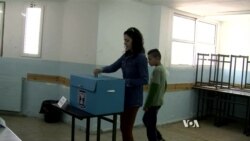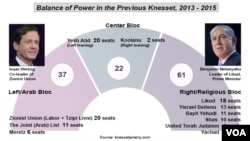Exit polls by Israeli media indicated that Prime Minister Benjamin Netanyahu's Likud party was running neck and neck with a center-left alliance led by the opposition Labor party in Tuesday's election, with each projected to receive 27 seats in the next parliament.
Final results were not expected until Wednesday, but the polls conducted by the country's three main television channels indicated a tight race that would make the formation of the next coalition government long and difficult.
Some analysts said the unofficial results gave a slight edge to Netanyahu because of support from hard-line right-wing and religious parties, but they added this was not certain.
The unofficial results indicated that the United List of four Arab-led parties was poised to become the third-largest group in the parliament. United List leaders have said they would support the center-left alliance led by opposition leader Isaac Herzog, but they would not join in any coalition government.
As a result, many believe that centrist parties could determine who forms the next government.
Israelis voted in large numbers after a last-minute push by candidates to turn out the vote.
In Jerusalem's working-class neighborhood of Katamonim, 74-year-old Ester Dabul, 74, went to the polls in her wheelchair. Everyone, she said, should vote.
"It is good that they vote," Dabuls said, "for the people to become stronger, to be together, hand in hand, one heart, one soul."
Office worker Sari Levi, a divorced mother of two, said socioeconomic issues were her highest priority.
She said she wanted the government to take care of the weak, the elderly, those who cannot afford housing and young couples. She added that for the sake of her children, she also would like the new government to restart the stalled peace negotiations with the Palestinians.
Netanyahu, seeking an unprecedented fourth term, underscored his dedication to protecting Israel’s security. Herzog said Netanyahu had failed to deliver on his promises to reduce the cost of living and shrink the gap between rich and poor.
Key Players in Israel's March 17 Parliamentary Election
Key Players in Israel's March 17 Parliamentary Election
BENJAMIN NETANYAHU: Popularly known as "Bibi," 65-year-old veteran is seeking fourth term as prime minister as head of right-wing Likud party.
ISAAC HERZOG: Co-leader of center-left Zionist Union, Herzog, 54, is lawyer who has headed Labor Party since 2013.
TZIPI LIVNI: Co-leader of center-left Zionist Union with Isaac Herzog, Livni, 56, served as justice minister and chief peace negotiator with Palestinians.
YAIR LAPID: In 2013 election, his centrist Yesh Atid party came second behind Netanyahu's Likud. Lapid is 51.
NAFTALI BENNETT: 42-year-old far-right Jewish Home party head was 2013 surprise success; advocates annexation of much of occupied West Bank.
AYMAN ODEH: 40-year-old Arab candidate remains obscure to most Jewish Israelis; party he leads, Joint Arab List, is gaining momentum in polls.
MOSHE KAHLON: A former communications minister, Kahlon, 54, formed a new centrist party, Kulanu [All of Us], in January.
AVIGDOR LIEBERMAN: Israel's Moldovan-born foreign minister, 56, leads ultranationalist Yisrael Beiteinu party; it ran jointly with Likud in 2013 election.
Source: Reuters
The Unity List of four Arab-led parties attracted some Israeli Arab voters to the polls for the first time. One of these was teacher Wafa Awad, 30, who voted in the predominantly Arab neighborhood, Beit Safafa.
She said this was the first time she'd voted. She participated because she felt there was something new to support, especially since the Arab-led parties joined together. She added that she hoped Arab Israelis got a positive result out of it.
Lawyer Osama Sa’adi said the United List would be a force for positive change for Arab Israelis, who form 20 percent of the Israeli population but are under-represented in government and civil service.
“This is a very big difference and we want to use this power in order to influence the map of Israel and to achieve a just peace, democracy and full rights and equality for our people," Sa'adi said.
Once the official results are in, Israeli President Reuven Rivlin, after consulting with each party, is to designate one leaders to form the new government.
Palestinian statehood
Ahead of the voting, Netanyahu reversed his earlier stance on Palestinian statehood, saying Monday that he would never support a Palestinian state if he remained in office.
"I think that whoever moves to establish a Palestinian state or intends to withdraw from territory is simply yielding territory for radical Islamic terrorist attacks against Israel: This is the genuine reality that was created here in the past few years. Those who do not understand that bury their heads in the sand," the Israeli leader said.
His comments marked a reversal of long-standing promises to the U.S. and were seen as a last-ditch effort to appeal to hard-line voters.
Critics cite Netanyahu's reversal on Palestinian statehood as evidence that he was never fully committed to the long-stalled Middle East peace process. Supporters largely attribute his revised stance to rising tensions with Hamas and its widely perceived Iranian backers.
Herzog has said Israel should negotiate with the Palestinians. He has promised to revive peace efforts, repair ties with the U.S. and reduce the growing gaps between rich and poor.
"Whoever wants to follow [Netanyahu's] path of despair and disappointment will vote for him,'' Herzog said after casting his vote, The Associated Press reported. "But whoever wants change, hope and really a better future for Israel will vote the Zionist Union led by me.''
Some material for this report came from AP.








